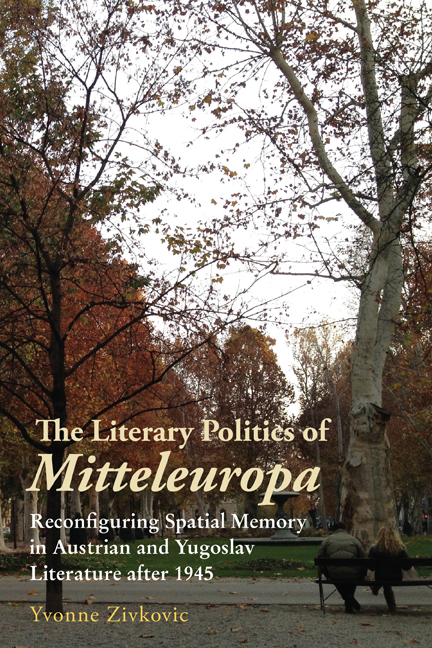 The Literary Politics of Mitteleuropa
The Literary Politics of Mitteleuropa Book contents
- Frontmatter
- Contents
- Acknowledgments
- Abbreviations and Note on Translations
- Introduction: Mitteleuropa as a Transnational Memory Discourse
- 1 The Legacy of Mitteleuropa: Between Geopolitics and Geopoetics
- 2 Ingeborg Bachmann and Peter Handke: The Austrian Mitteleuropa
- 3 Mitteleuropa as Conflicted Community in the Writings of Danilo Kiš and Aleksandar Tišma
- 4 Mitteleuropa after 1989: New Memory Challenges in Christoph Ransmayr and Dubravka Ugrešić
- Conclusion: Mitteleuropa Literature in the Twenty-First Century: Revisiting the Promise of Border-Crossing
- Bibliography
- Index
1 - The Legacy of Mitteleuropa: Between Geopolitics and Geopoetics
Published online by Cambridge University Press: 23 March 2021
- Frontmatter
- Contents
- Acknowledgments
- Abbreviations and Note on Translations
- Introduction: Mitteleuropa as a Transnational Memory Discourse
- 1 The Legacy of Mitteleuropa: Between Geopolitics and Geopoetics
- 2 Ingeborg Bachmann and Peter Handke: The Austrian Mitteleuropa
- 3 Mitteleuropa as Conflicted Community in the Writings of Danilo Kiš and Aleksandar Tišma
- 4 Mitteleuropa after 1989: New Memory Challenges in Christoph Ransmayr and Dubravka Ugrešić
- Conclusion: Mitteleuropa Literature in the Twenty-First Century: Revisiting the Promise of Border-Crossing
- Bibliography
- Index
Summary
SINCE THE FIRST WAVE of critical Mitteleuropa writing in the interwar period, the discourse has been caught between the dichotomy of its political and poetical implications. Its assessment depended on which camp one chose: Siding with the poets’ idea of Mitteleuropa connoted, particularly since the interwar years in Austria, a sense of regional solidarity that transcended national, ethnic, and religious affiliations, and that was firmly grounded in the memory of the Habsburg Empire. It thrived off bourgeois ideas of education and the mediating powers of its cultural production, be that literature, the arts, or philosophy. As such it was revived by the Eastern European dissidents of the 1980s, who sought to distinguish it from the Mitteleuropa of the politicians, since the (geo) political term “Mitteleuropa” evoked associations of German expansionist and imperialist aspirations that had been developed since the midnineteenth century. In this context, Central Europe appeared merely as coveted geographical territory, a scarcely populated space awaiting cultivation and proper administration. It generally regarded the local population as culturally inferior and in need of civilizing education (which pitted Germans against Slavs, but also Jews and other minorities). In its moderate expression this translated into a civilizing mission led by the Germans; under totalitarian auspices, it turned into a plan for the displacement, enslavement, and extinction of the undesirable majority of its Slavic and Jewish population. Hitler's objective to conquer this “Lebensraum im Osten” (living space in the east) on behalf of the space-deprived German people was a major motivation for the instigation of the Second World War—it is not a coincidence that it began with the occupation of Poland, which had been claimed as German territory by Pan-German agitators since the mid-nineteenth century. With the almost seamless takeover by Soviet rule after the war, which stripped Poles, Czechs, Hungarians, and others of their national sovereignty once more, the collective identity of Central Europe came to be associated with the experience of displacement, as Czesław Miłosz explained in 1986: “Central Europe is hardly a geographical notion. It is not easy to trace its boundaries on the map even if, while walking the streets of its cities, we do not doubt of its survival, whether that be in my native Wilno, or the differently baroque Prague or medieval-Renaissance Dubrovnik.
- Type
- Chapter
- Information
- The Literary Politics of MitteleuropaReconfiguring Spatial Memory in Austrian and Yugoslav Literature after 1945, pp. 31 - 80Publisher: Boydell & BrewerPrint publication year: 2021


